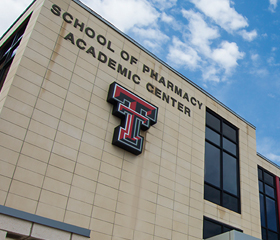PharmD Program
How to Become a Pharmacist
With the Texas Tech School of Pharmacy
 The TTUHSC School of Pharmacy in Texas is proud to offer the distinguished Doctor
of Pharmacy (Pharm.D.) program as its single professional degree. The Pharm.D. is
an innovative, cutting-edge four-year professional program designed to provide all
the knowledge and skills required in this ever-changing field. The Doctor of Pharmacy
program requires at least two years of pre-professional studies that may be completed
at any accredited college or university. For those seeking a career in pharmaceutical sciences,
this path leads to a professional, adaptable skill-set, allowing for bountiful future
opportunities.
The TTUHSC School of Pharmacy in Texas is proud to offer the distinguished Doctor
of Pharmacy (Pharm.D.) program as its single professional degree. The Pharm.D. is
an innovative, cutting-edge four-year professional program designed to provide all
the knowledge and skills required in this ever-changing field. The Doctor of Pharmacy
program requires at least two years of pre-professional studies that may be completed
at any accredited college or university. For those seeking a career in pharmaceutical sciences,
this path leads to a professional, adaptable skill-set, allowing for bountiful future
opportunities.
Since students within the program spend the majority of each weekday mastering their craft in classes, laboratories, and clinical experiences, studies must be on a full time basis. Students are admitted once each year for enrollment in the fall semester.
The goal and vision of the program is to prepare entry-level pharmacy practitioners, eligible for licensure to become a pharmacist in any state, with a wide range of capabilities. These skills include practice knowledge and skills in drug distribution and control, practice management, and direct patient skills to manage drug therapy and provide therapeutic management of patients as recently authorized by the 1995 Texas State Legislature.
Featuring campuses in Abilene, Amarillo, Dallas, and Lubbock, this outstanding School of Pharmacy in Texas will utilize community pharmacies, clinics, hospitals and nursing homes throughout Texas for clinical instruction. These experiences are invaluable to becoming a pharmacist and navigating the landscape of the pharmaceutical industry.
Doctor of Pharmacy Program Purposes and Functions
The purpose of the program is to prepare entry-level pharmacy practitioners with competencies in:
- Collecting and interpreting relevant patient data as a basis for therapeutic decision making.
- Prospectively reviewing medication orders and the patient's database to evaluate efficacy, appropriateness, potential toxicity, and cost effectiveness of prescribed drug regimens.
- Counseling patients, caregivers, and other health professionals on the rational, safe, and effective use of medications.
- Counseling patients and caregivers on the rational, safe, and effective use of non prescription medication.
- Developing therapeutic care plans.
- Assessing and therapeutically managing patients according to a written protocol in partnership with a physician, including prescribing legend medications under protocol.
- Monitoring a patient's therapeutic outcomes according to his/her therapeutic care plan and intervene as appropriate.
- Preparing medication as appropriate to meet patients' needs according to Texas and Federal laws, rules and regulations, including the compounding and dispensing of dosage forms.
- Administering medications.
- Supervising pharmacy personnel.
- Interpreting financial information relevant to a pharmacy practice environment.
- Practicing in an ethical manner.
PharmD Program of Study
Year 1
In this first year in the School of Pharmacy, students will be taught basic biomedical and pharmaceutical sciences in focused, informative courses. Pharmaceutical sciences include the study of physical, chemical and biological aspects of drug dosage forms; drug action; and pharmacotherapy. The first year will also introduce clinical practices to students by initiating drug and poison information telephone calls, patient counseling on non-prescription drug products, and working with patient care support services. These activities prepare students for the groundwork necessary to deliver the best quality care in the field.
Year 2
Within the second year of the Doctor of Pharmacy program, students will spend time in specialized courses and laboratories, focusing on the study of disease states and pharmacotherapy. Our students will learn special skills in therapeutically dosing and monitoring patients with potentially toxic therapeutic agents. As clinical experience is equally important to the quality of coursework provided, students will develop practice knowledge and skills through studying the use and potential problems with commonly prescribed medications. Additionally, the basics of physical assessment skills for therapeutic drug monitoring will be introduced. Within this year, students begin clerkships in community pharmacy practice, affording the real-time practice that will certainly be utilized in their future careers.
Year 3
The third year on the road to becoming a pharmacist continues studies of disease states and pharmacotherapy. In the experiences provided in clerkships, students will largely focus on drug distribution and control within institutional practice skills. Our accomplished instructors will help provide students with the tools needed for managing drug therapy and providing case management. These learning experiences are offered in patient care facilities.
Year 4
The final year in this program devotes 48 weeks to full-time clinical pharmacy participation in various patient care sites, allowing for the maximum level of quality experiences. These clinical pharmacy trainings involve eight rotations, each of which last six weeks, filling the whole year of study with fully immersive learning opportunities.
The third and fourth year of study may be based at any of the Texas Tech University Health Sciences Center campuses at Amarillo, Dallas, or Lubbock. Our multitude of campuses provide a uniquely flexible opportunity for those looking for a school of pharmacy in Texas. The student will be asked to give his/her location preference at the time application for admission is made, but the assignment of sites can not be guaranteed. Relocation expenses are the student's responsibility.

